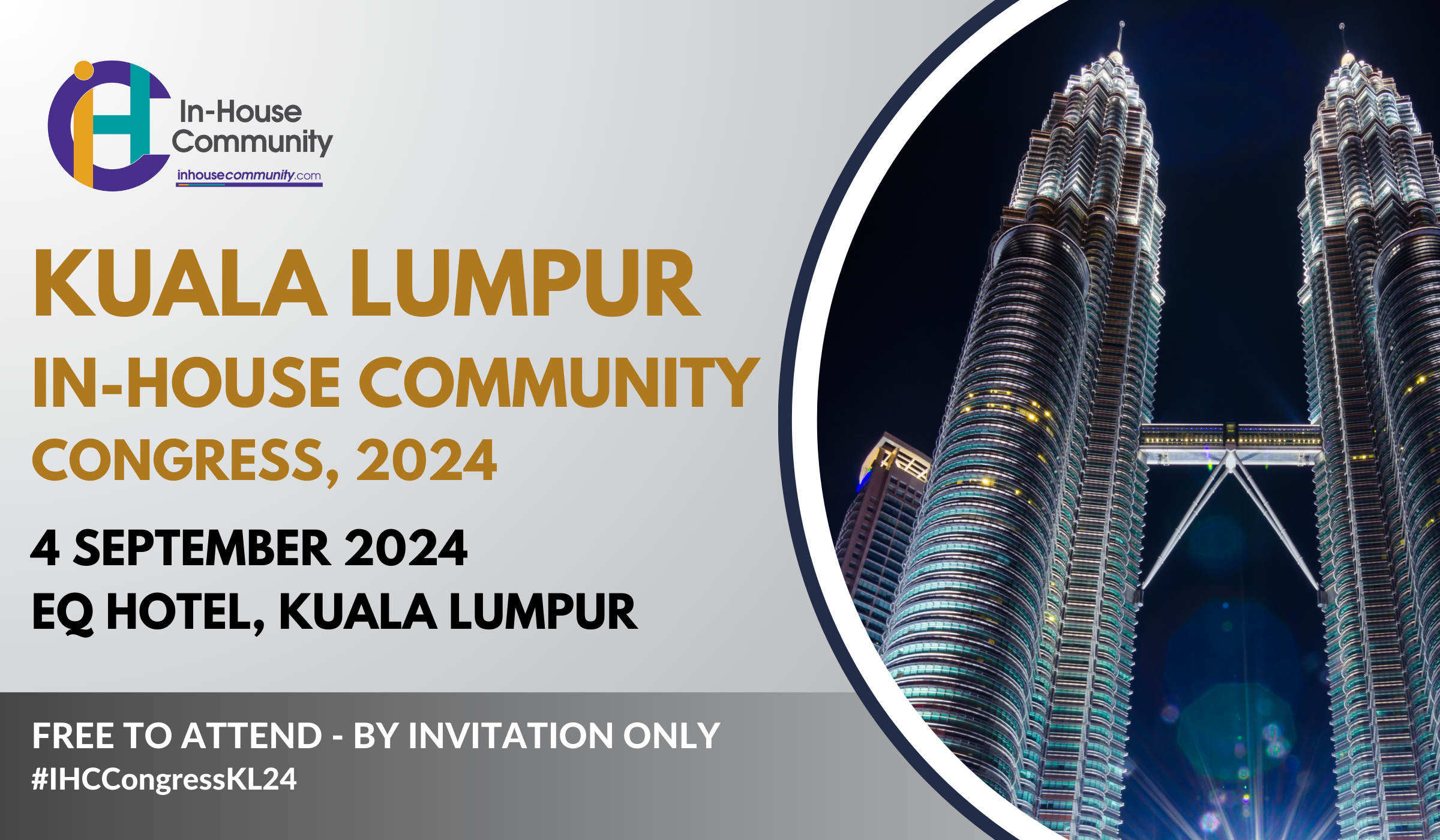
Published in Asian-mena Counsel: Dispute Resolution Special Report 2019
With a variety of new legislation in the emirates, Louise Bowmaker of Horizons & Co looks at some of the most significant recent and upcoming changes.
 The UAE is nothing if not dynamic and its legal jurisdictions are no exception, particularly the Dubai International Financial Centre (DIFC) and Abu Dhabi Global Market (ADGM). This article gives a roadmap of changes afoot and highlights key recent legal developments.
The UAE is nothing if not dynamic and its legal jurisdictions are no exception, particularly the Dubai International Financial Centre (DIFC) and Abu Dhabi Global Market (ADGM). This article gives a roadmap of changes afoot and highlights key recent legal developments.
UAE – Foreign direct investment
The requirement for majority Emirati ownership of businesses is a well-known impediment to foreigners looking to do business in the UAE. Happily for those concerned, in September 2017 the UAE Cabinet announced the Foreign Direct Investment Law (Federal Decree Law No. 18) which paved the way towards a relaxation of the local ownership requirements in certain specified sectors and activities.
A recent update came in the form of a Cabinet official press release on July 2, 2019; a Resolution has been passed approving the “positive list” of 13 sectors which are now eligible for 100 percent foreign ownership. A “negative list” of sectors which will remain subject to the majority local ownership requirement was published last year (oil and gas, banking, utilities, road and air transport, telecoms and medical retail). The positive list is:
- Renewable energy
- Space
- Agriculture
- Manufacturing
- Transport and storage
- Hospitality and food services
- Information and communications services
- Professional, scientific and technical
- Administrative and support services
- Healthcare
- Arts and entertainment
- Construction
- Education
The relevant activities within these sectors remain to be specified. For existing companies, foreign owners looking to secure 100 percent ownership for the first time may wish to consider taking legal advice as to how they might deal with the problem that they are presently minority owners.
UAE – Tax and economic substance reporting requirements
On April 30, 2019, Cabinet Resolutions No. 31 and No. 32 of 2019 introduced certain reporting requirements for UAE businesses. These resolutions form part of international efforts to improve tax transparency.
Resolution No. 31 requires UAE businesses carrying on specific licensed activities to meet economic substance criteria and make an annual report to that effect. Key features include:
- The Resolution applies to UAE businesses wherever they may be based, be it onshore or a free zone including the DIFC and the ADGM
- All UAE companies going forward must file an annual notice stating whether or not they carry on the specific activities in question. A company failing to do so will face fines
- The relevant activities are: banking; insurance; investment fund management; finance leasing; headquarters; shipping; holding company; intellectual property; distribution and service centres
- Entities undertaking the relevant activities must meet the economic substance criteria
- The criteria are: core income generated from activities in the UAE; management undertaken in the UAE; an appropriate number of full-time employees within the UAE; adequate operating expenditure; and adequate assets held in the UAE.
Resolution No. 32 of 2019 requires certain members of multinational groups to file detailed annual reports. Those affected are multinational group parents and affiliates where the parent of the group is not required to file a tax report in its jurisdiction of tax residency. Only those groups with revenues of AED 3.15 billion or more per annum are affected.
The reporting requirements are relatively onerous and include financial reporting extending to profit and loss, income tax paid, declared capital, assets and number of employees.
DIFC – Insolvency Law, Law No. 1 of 2019
While Gulf law makers generally are not known for their interest in insolvency legislation, the DIFC has continued to take the lead with Law No. 1 of 2019, effective from June 13, 2019. The Insolvency Law repeals and replaces the previous insolvency law, Law No 3 of 2009. It applies to companies operating in the DIFC.
The DIFC has made its name as a common law jurisdiction largely based upon the laws of England and Wales, and is a well-liked and well-established feature of the UAE legal market. In its latest legislative output, however, the DIFC has shown its willingness to look beyond England & Wales for inspiration and in particular across the Atlantic to the US.
Rehabilitation
Part 3 of the Insolvency Law introduces “Rehabilitation Plans” which may make for familiar reading for US practitioners. In addition to Company Voluntary Arrangements and Receiverships where appropriate and/or desirable, struggling companies now have a new debtor-in-possession option open to them:
- Where directors wish to propose a Rehabilitation Plan, they may apply to the Court and obtain a 120-day moratorium (article 16). They must show only that: (i) the company is or is likely to become unable to pay its debts; and (ii) there is a reasonable likelihood of a successful Rehabilitation Plan being reached between the Company and its creditors and shareholders (article 13)
- A Rehabilitation Nominee will be appointed but the directors will continue to manage the company’s affairs, save in cases of fraud, mismanagement etc.
- Creditors may apply to court for relief from the moratorium (article 16) or to terminate it “upon cause shown, including bad faith” (article 23(1)).
After a Rehabilitation Plan proposal has been put forward creditors and shareholders will vote. The court must then then sanction the Plan at a post plan hearing (article 27) if certain criteria are met, including:
- The Plan is not unfairly prejudicial to each class of creditors and shareholders and the company’s general body of creditors taken as a whole
- The Plan has been approved by each class of creditors and shareholders (>75 percent in value of those voting) or, if a class of interests is impaired under the Plan, at least one impaired class of creditors has voted to accept (this echoes the US Bankruptcy Code, section 1129)
- Any class which has voted against the Plan will receive at least as much value as such class would receive in a winding up
- Any holder of a claim that is junior to the claims of any dissenting class will not receive any distributions pursuant to the Rehabilitation Plan until dissenting creditors have been paid in full.
The court may order such relief as it thinks just and appropriate at the post plan hearing if a creditor or shareholder applies in writing no less than 10 days prior to the post plan hearing.
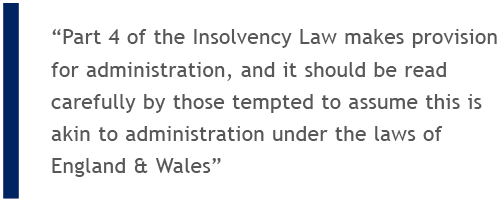
Administration
Part 4 of the Insolvency Law makes provision for administration, and it should be read carefully by those tempted to assume this is akin to administration under the laws of England & Wales. There are two key points of distinction:
- In the DIFC, administrators of a company can only be appointed after a company has filed a Rehabilitation Plan Notification at court. Creditors may apply to appoint (article 32) or the court may appoint of its own motion (article 22(2)) in either case where there is evidence of misconduct on the part of the directors
- The purposes of administration in the DIFC are limited to seeking to approve Company Voluntary Arrangements or Rehabilitation Plans, or undertaking investigations (transactions at undervalues, false representations to creditors, preferences and the like) (article 32(8)).
Cross-border insolvency
Those dealing with foreign and international companies will be pleased to see the adoption in Part 7 of the Insolvency Law of the United Nations Commission on International Trade Law (UNCITRAL) Model Law (with modifications), ushering in a welcome practice of cooperation in cross-border insolvency proceedings.
Part 7 also makes express provision that the DIFC court shall assist foreign courts in the gathering and remitting of assets maintained within the DIFC in relation to insolvency proceedings in that foreign jurisdiction, upon request (article 117(1)). Meanwhile, article 118 provides that a foreign company in the DIFC may be wound up in accordance with the Insolvency Law notwithstanding the company in question may be the subject of insolvency proceedings elsewhere. Perhaps surprisingly, a foreign company can even be wound up if it has been dissolved (and therefore no longer exists) in its place of incorporation.
ADGM courts – Third-party funding
Litigation (and arbitration) funding is hot topic across the Gulf and the ADGM has joined the trend with the publication of its Litigation Funding Rules published on April 16, 2019. The DIFC made similar express provision for third party funding in 2017, with Practice Direction No. 2 of 2017 on Third Party Funding in the DIFC Courts (Practice Direction).
Key aspects of the ADGM Litigation Funding Rules are as follows:
- A funder’s principal business must be the funding of proceedings to which it is not a party. There are also capital requirements; a funder must have qualifying assets of not less than US $5m
- A funder must take reasonable steps to ensure that the litigant has had independent legal advice in relation to the litigation funding agreement (“LFA”)
- LFAs must be in writing and set out the scope and amount of funding, timing of payment and steps the funder intends to take to recover payment
- The LFA must state whether the funder is liable to pay any adverse costs or any adverse costs insurance premiums
- The amount to be paid by the litigant must comprise any successful costs order in the proceedings and an amount calculated with reference to the funder’s expenditure.
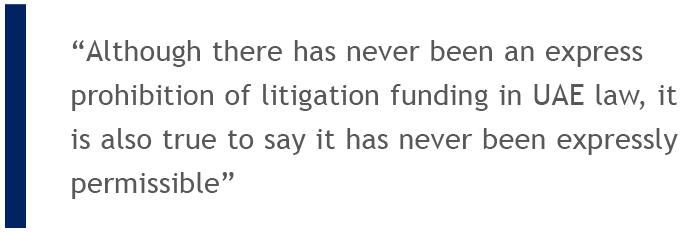
This development follows a welcome trend albeit the capital requirements are likely to be a prohibitively high bar for many”. Litigation funders have historically been cautious of the UAE market, largely due to uncertainty as to whether such funding would be permissible under UAE law. Although there has never been an express prohibition of litigation funding in UAE law, it is also true to say it has never been expressly permissible. ADGM now joins the DIFC in giving an unequivocal green light to litigation funders.
Consultation paper – Data protection in DIFC
As is the trend in many countries, the DIFC is looking to bring its data protection laws up to date. Those operating in the DIFC may wish to cast their eye over Consultation Paper No. 6 of 2019 – Data Protection Law. The Consultation Paper was published in June and those wishing to participate in the public consultation period have until August 18, 2019 to do so.
The Consultation Paper aims to bring DIFC standards in line with international developments, including the EU General Data Protection Regulation (GDPR). Among other things, the Consultation Paper introduces data protection officers, principles of accountability and data breach notification, and introduces new sanctions and enforcement.
Soon to be effective – DIFC Employment Law
On August 28, 2019, DIFC Employment Law, Law No. 2 of 2019 will come into effect. It will repeal and replace the previous DIFC Employment Law. Highlights include:
- A limitation period for employment claims will be introduced for the first time — six months
- For the first time provision will be made for paternity leave (five working days of paid leave plus time off to attend ante-natal classes)
- Whereas at present employees are allowed a full 60 days paid sick leave a year, this will be amended to 10 days fully paid, 20 days at half pay and the remaining 30 days unpaid
- Pregnancy, maternity and age will be added to the list of protected characteristics and provision is made for remedies in cases of discrimination
- Part-time workers are recognised for the first time with the result that their statutory benefits will be pro-rated.
More to come
It is a genuine pleasure to observe and participate in the ever-evolving UAE legal landscape. As we hope is apparent from this update, the speed and, crucially, quality of change in the UAE makes it an exciting place to be.

E: louise.bowmaker@horizlaw.ae
T: (971) 4 354 4444
![]() Click Here to read the full issue of Asian-mena Counsel: Dispute Resolution Special Report 2019.
Click Here to read the full issue of Asian-mena Counsel: Dispute Resolution Special Report 2019.



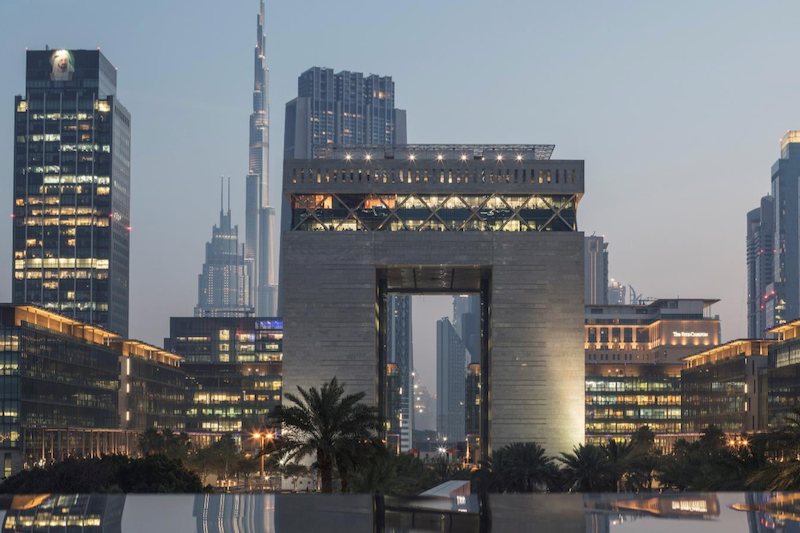
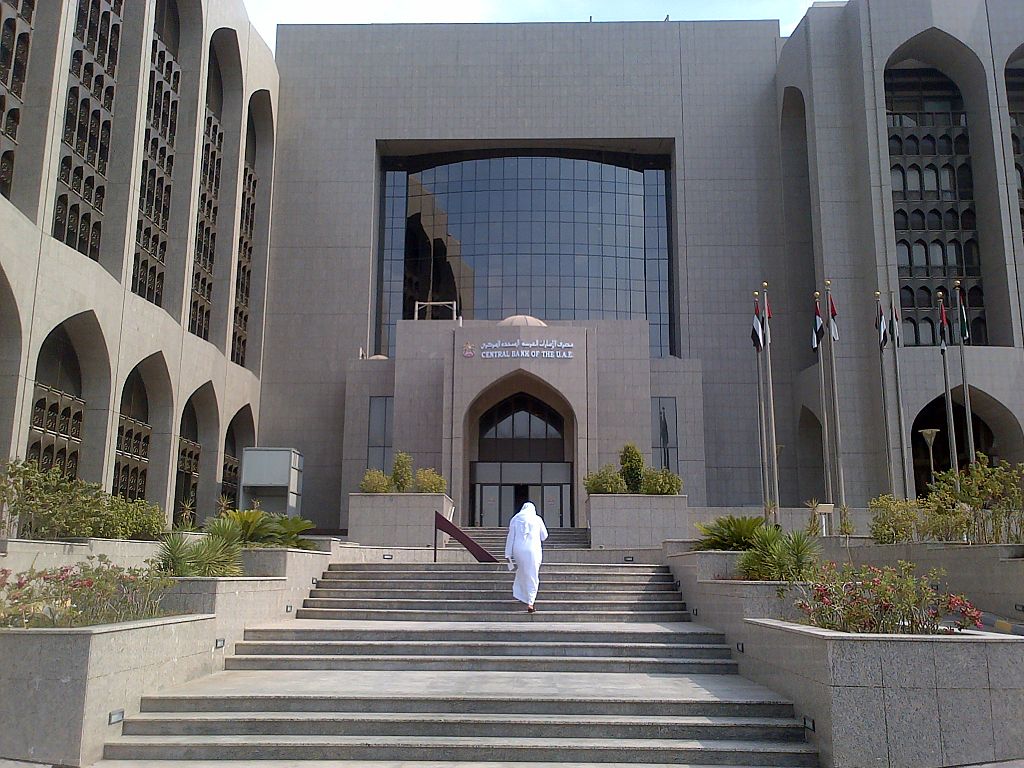




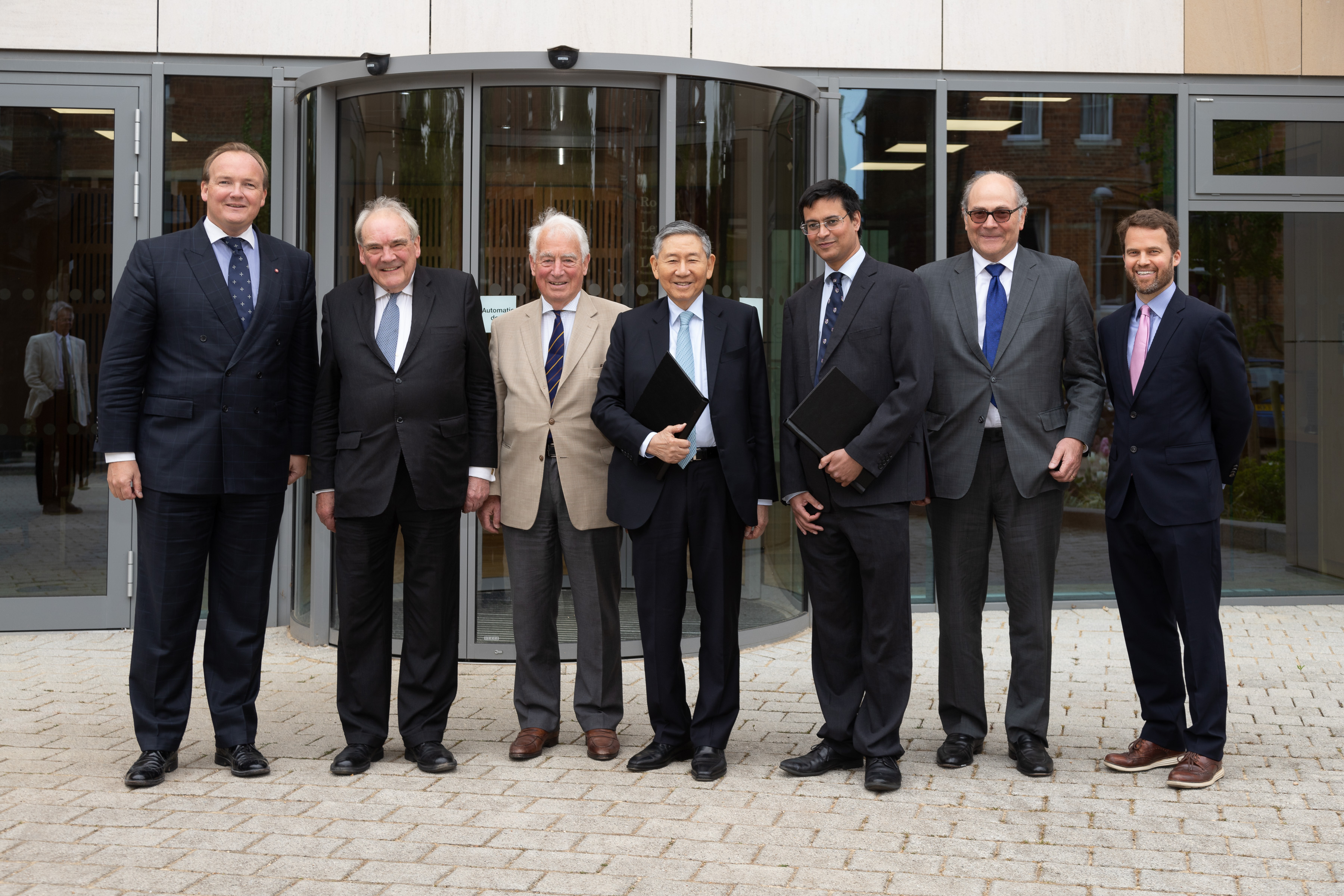





 Horizons & Co
Horizons & Co Areen Jayousi
Areen Jayousi Adv. Ali Al Zarooni
Adv. Ali Al Zarooni



